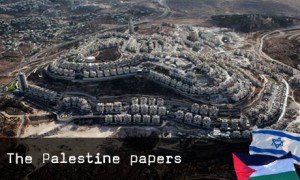 Maan News Agency, January 27, 2011
Maan News Agency, January 27, 2011
The Huffington Post, January 28, 2011
Earlier this week, Al Jazeera revealed the Palestine Papers — 1,600 internal documents that give a behind-the-scenes look at Israeli-Palestinian negotiations.
Since then, Middle East analysts, observers, and op-ed writers have been talking about the usual doomsday scenarios: the collapse of the peace process, a Hamas takeover of the West Bank, war, or a bi-national, one-state solution.
Of course, no one can predict the future. What we can discuss is possible outcomes:
First, the so-called collapse of the so-called peace process — this happened a long time ago. The Palestine Papers just confirm what any man on the street in Tel Aviv or Ramallah could have told you.
Second, there is not a chance of a Hamas takeover in the West Bank. Any rumblings will be squashed by the PA and Israel. The close collaboration between the two was no secret before the Palestine Papers. Some have speculated that the Palestine Papers would spell the death of the PA — the Palestinian people would be so enraged that the PA is willing to give away so much, including the right to return which is considered sacred by many Palestinian refugees, that we might see a Tunisia-like scenario erupt in the West Bank.
Or so the thinking went.
But, so far, that hasn’t happened. And it won’t. Because the Palestinians know that protests and riots would give Israel an excuse to reoccupy the whole of the West Bank. The status quo will remain. At least for now.
And, lastly. A war between who? Israel and the PA? Unlikely. As the Palestine Papers prove, the PA is groveling and weak and either unwilling or unable to stand up to Israel. Israel and Hamas? Israel precluded that with its savage attacks on the Gaza Strip during Operation Cast Lead. And it is Hamas that is now keeping militant groups in check in the Strip.
The way I see it, the Palestine Papers help pave the way for two scenarios: the eventual establishment of a democratic, bi-national state or the more likely outcome that the PA will continue its push for international recognition of a Palestinian state.
Guess which one makes me suspect that it was actually the PA that leaked the Palestine Papers?
The Palestine Papers suggest that the Israelis don’t care about peace. What does Israel care about? Land, land, and more land. After the Palestinians offered up the “biggest Yerushalayim in history“–even using the Hebrew word for the city — Tzipi Livni waved them away because it didn’t “meet our demands” for an Israeli annexation of Jewish settlements that are located deep in the Palestinian West Bank.
So why might the PA leak papers that show it making tremendous concessions and getting nothing in return? Why would the PA take the risk of alienating the Palestinian public?
To gain international support for a declaration of a Palestinian state along 1967 borders.
That support is already gaining momentum. Latin America is on board. Russia is, too. And much to Israel’s chagrin, Ireland, France, and Spain have all upgraded Palestinian delegations from missions to embassies — suggesting that recognition of a Palestinian state could be on the horizon.
There’s also the draft of a UN resolution against Israel’s illegal settlements in the occupied West Bank. Yes, it’s just a draft — the UN has yet to pass the resolution and may not because of the US — but its submission hints that the Palestinians might be turning to the UN for the same kind of support that Israel got in 1947.
Israelis talk a lot about the need for a peace process to establish a Palestinian state (conveniently ignoring the fact that their own state was the result not of a peace process but, in part, of a UN vote in November of 1947). But the Palestine Papers prove that this “peace process” just allows Israel to build more settlements and grab more Palestinian land. And the papers also prove that Israel is unlikely to make the sacrifices that Palestinians are willing to make.
While the Palestine Papers might make the PA look pathetic to some of its own — and that’s why the PA has distanced itself from the papers, of course — the PA comes out looking quite sympathetic to the international community. And right now, as the PA pushes for international recognition, it’s the international community that matters to them.